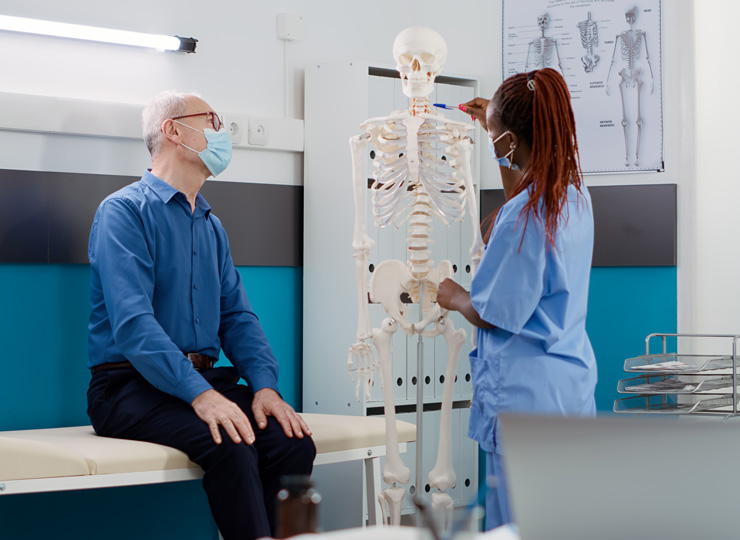
April 5, 2023
Want to lower your risk of Alzheimer’s disease? Take a look at the health of your bones. A new study found that people who have low bone density, or “brittle bones,” a risk factor for osteoporosis, are at higher risk of developing dementia compared to their peers with healthy bones.
For the study, researchers in the Netherlands followed 3,651 older men and women for about 11 years. Their average age was 72 at the start of the study, when all were free from Alzheimer’s disease or other serious memory disorders.
The participants were given medical checkups and dementia screening tests every few years. They also had X-ray bone scans to measure their bone mineral density. The researchers split them into thirds, according to whether they had low, medium or high bone density.
Over the next decade, 688 of them, or 19 percent, developed Alzheimer’s disease or another form of dementia. Among the people in the group with the lowest bone density, 90 developed dementia, compared to 57 people in the group with the highest bone density.
The researchers considered various risk factors for Alzheimer’s, including advancing age, a high body mass index, smoking, other medical conditions like diabetes and high blood pressure, lack of physical activity, and the presence of the APOE-E4 gene. They calculated that those with the lowest bone density were 42 percent more likely to develop dementia than those with the densest bones.
“Previous research has found factors like diet and exercise may impact bones, as well as the risk of dementia,” said study author Dr. Mohammad Arfan Ikram of the Erasmus University Medical Center in Rotterdam. “Our study found that bone loss indeed already occurs before dementia and thus is linked to a higher risk of dementia.” The findings were published in Neurology, the medical journal of the American Academy of Neurology.
Many older adults have low bone mineral density, putting them at risk of bone fractures. The findings show only an association and cannot prove cause and effect. Good bone health may just be a general measure of good overall health. But the findings suggest that keeping bones healthy may be one way to help ward off dementia with advancing age. People with bone loss could also be targeted for screening and improved care, the authors say.
To help keep bones strong, experts advise regular physical activity, including both aerobic and weight-bearing exercises. They also recommend a nutrient-rich diet containing a medley of fruits, vegetables and other foods high in calcium, vitamin D and protein. In addition, void smoking and excess alcohol intake. The same lifestyle measures may also help to keep Alzheimer’s at bay.
By ALZinfo.org, The Alzheimer’s Information Site. Reviewed by Marc Flajolet, Ph.D., Fisher Center for Alzheimer’s Research Foundation at The Rockefeller University.
Source: Tian Xiao, MD; Samuel Ghatan, MD; Sanne S. Mooldijk, MD; et al: “Association of Bone Mineral Density and Dementia: The Rotterdam Study.” Neurology, March 22, 2023











